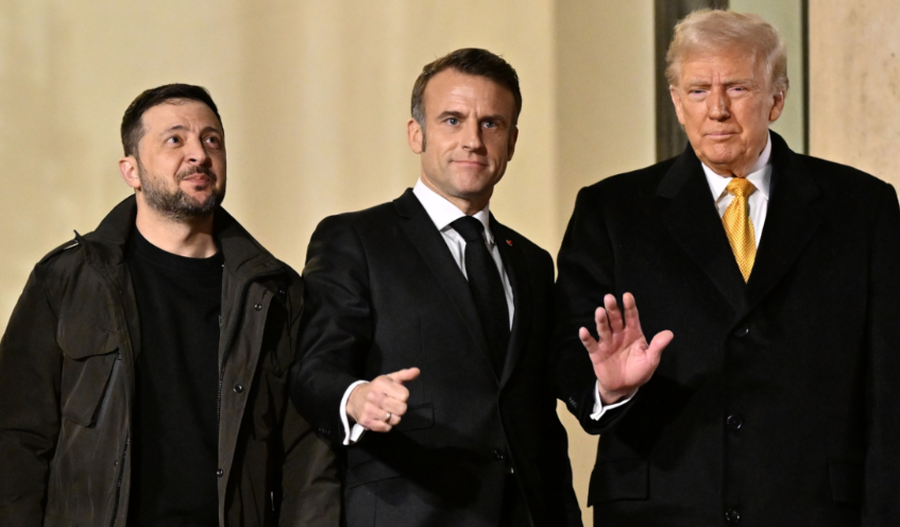
With the catchy title “Europe has a leadership vacuum. How will they manage Trump" , the New York Times newspaper makes an in-depth analysis of the EU's relations with the American tycoon, a month before the president-elect re-enters the White House.
This analysis describes a scene of decay prevailing on the European political scene, as many countries see their governments either overthrown or hanging in the balance. And all of this is happening while the war in Ukraine continues and the scene in the Middle East has changed drastically.
As European leaders gathered in Brussels on Wednesday for dinner with Ukrainian President Volodymyr Zelensky, a dilemma overshadowed the discussion. This dilemma is related to the imminent return of Donald Trump to the White House, reports the historical newspaper.
The concern is not only about the possibility of a change in US policy on the war in Ukraine. Europe is facing an internal leadership crisis that threatens its cohesion at a time when Washington may abandon support for Kiev.
Political upheavals follow each other in the great capitals of Europe. In Germany, Olaf Scholz's government collapsed, plunging the country into a polarized election season. In France, Emmanuel Macron has weakened after months of social unrest, while in Britain, despite the establishment of a Labor government under the leadership of Keir Starmer, domestic economic difficulties and the impact of Brexit prevent the country from playing a leading role.
Former German ambassador to the US, Wolfgang Isinger, describes the situation with concern. " It is a terribly bad time for Germany to be in an electoral campaign, with strong political confrontations ," he said.
Political instability appears to be reducing the ability of European countries to respond to the pressures that Trump may bring with his proposals to end the war.
The prospect of a security zone and the European impasse
American politics could change drastically with Trump's return to power. Already, there have been reports of a plan to create an 800-mile buffer zone between Ukraine and Russia, to be manned by 40,000 European troops. Such a plan, although difficult to implement without US support, would cause serious political backlash in Germany, Britain and other countries where participation in military operations remains taboo.
" This buffer zone is not going to materialize ," says Jeremy Shapiro, director of research at the European Council on Foreign Relations. " But it is a big move in the political theater ," he added. Trump's strategy often involves this kind of theater, aiming to break European unity and attract attention.
The challenge for Europe is not to allow Trump to exploit its internal weaknesses. Instead, its leaders should ensure that Europe has a say in any diplomatic process involving the US, Ukraine and Russia.
Weakening leadership in Germany and France
Germany, the cornerstone of European unity, is in limbo, with elections expected in February and negotiations to form a government likely to drag on until the spring. Friedrich Merz, Scholz's likely successor, has pledged to continue military support for Ukraine but also to seek an end to the conflict.
In France, Macron remains active on the international stage, proposing peace initiatives, but his domestic political position is extremely fragile. The political paralysis after the last election and the lack of a stable government limit his ability to lead a common European effort.
Strategic dependence on the US and the challenge of unity
The inability of the major European powers to provide strong leadership reveals a deeper structural problem: Europe's strategic dependence on the US. By hinting that Washington may withdraw its support for Ukraine, Trump has already caused concern.
Some European leaders are trying to cultivate personal relationships with Trump, hoping to secure better bilateral relations. Macron, for example, invited Trump to a prominent position at the opening of Notre Dame, while Scholz is said to be seeking a meeting with him before leaving office.
However, dependence on American politics endangers European autonomy. If the US changes strategy, Europe may be forced to adapt to new conditions, undermining its unity and influence.
Ukraine's critical challenge
After almost three years of war, the policy for Ukraine is also changing in Europe. Leaders have pledged to continue military support, but pressure is mounting to end the conflict. The challenge for Europe is to maintain its unity and use this critical moment to strengthen its autonomy, facing the twin challenges of the war in Ukraine and the return of Trump.
Europe's ability to overcome its internal crises and to face these challenges collectively will determine its future as a global geopolitical actor. (A2 Televizion)











